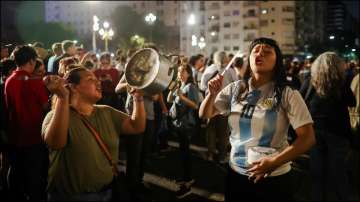Chaos raged in Argentina as thousands of people protested outside Argentina's Congress on Thursday, banging pots and waving the flag against newly-inducted President Javier Milei's 'shock therapy' reforms that seek to bring the country back from a severe economic crisis. Milei signed a deregulation decree that includes an end to limits on exports along with measures to loosen regulations.
Thousands of people took to the streets of Buenos Aires to protest against the government's austerity plans, led by representatives for the unemployed who sought more support for poverty-stricken families and individuals. The Argentinian President had promised deep spending cuts in a bid to curtail the country's soaring inflation.
"The measures that have just been taken, announced by DNU, are a blow to the entire working class because it has to do with our labour rights and because it continues with privatisation - and also affects our sovereignty. I think that the immediate response that is seen on the streets and throughout the country has to do with sending a signal that we will not let it go," said a protester.
The demonstrations went off relatively peacefully, after a government warning against blocking streets. Milei said that he would allow protests, but threatened to cut off public aid payments to people who block roads, and protesters were also forbidden to carry stricks, cover their faces and bring children.
What are the reforms?
The approximately 300 changes would earmark many government companies for privatization, and loosen protections for renters, employees and shoppers. The steps also include a 50% devaluation of the Argentine peso, cuts to energy and transportation subsidies, and the closure of some government ministries.
According to Milei, the decree aims to return freedom and autonomy to individuals and "start dismantling the enormous amount of regulations" that have hindered the economic growth of Argentina. The reforms also include plans to privatise the state-owned companies.
Argentina will weaken its currency (peso) by over 50 per cent to 800 per dollar, cut energy subsidies, and cancel tenders of public works, new Economy Minister Luis Caputo said last week. The robust and the most difficult decision was taken in order to minimise economic shock and to fix the country's prevailing economic crisis. The decision was met with surprise and criticism from farm groups who said that such a decision would negatively impact the industry.
The IMF called the measures "bold" and said in a statement they would "help stabilize the economy and set the basis for more sustainable and private-sector led growth" following "serious policy setbacks" in recent months. "The situation is critical with 45% poverty and 200% annualised inflation," presidential spokesperson Manuel Adorni earlier told a press conference.
Milei's plans for Argentina
Far-right political outsider Milei, who secured a thumping win in Argentina's presidential elections earlier this month, promised a dramatic change in Argentina's policies, including doing away with the central bank and cutting down government spending by closing some of the ministries.
In his election campaign, Milei called for several 'shock therapy' changes, including legalisation of the sale of human organs, slashing social spending, loosening regulations on gun control and cutting ties with China and Brazil. He also promised to abolish the central bank and introduce the US dollar in the Argentinian economy.
Argentina's inflation levels reached a painful height of 142% this year and an increase of 40% in inflation levels, prompting public disillusionment and Milei's victory in the presidential elections. His aggressive rhetoric throughout the campaign, including carrying chainsaws in public rallies, drew parallels with ex-US President Donald Trump.
(with inputs from Reuters, AP)
ALSO READ | Argentina to devalue its currency by over 50 per cent as part of emergency 'shock therapy'
Latest World News
